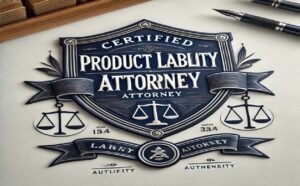Premises Liability Attorney: Your Guide to Legal Support

Have you ever slipped on a wet floor at the grocery store or tripped on a broken sidewalk? These accidents can happen to anyone; when they do, understanding premises liability law becomes crucial. In this article, we’ll delve into this critical legal aspect and show how premises liability attorneys can be instrumental in helping you get the compensation you deserve.
- Understanding Premises Liability
- The Role of a Premises Liability Attorney
- When to Hire a Premises Liability Attorney
- Choosing the Right Premises Liability Attorney
- The Legal Process in Premises Liability Cases
- Challenges in Premises Liability Cases
- Tips for Strengthening Your Premises Liability Case
- Cost and Fees Associated with Hiring a Premises Liability Lawyer
- Frequently Asked Questions (FAQs)
- Conclusion
Understanding Premises Liability
Before we discuss premises liability attorneys, let’s define premises liability. Landowners have a legal obligation to guarantee a secure setting for those who visit their premises. When they neglect this responsibility, and someone is injured. As a result, the concept of premises liability becomes applicable.
Common Types of Premises Liability Cases
Each premises liability lawsuit presents its own unique circumstances. Consider these widespread instances:
- Slip and fall accidents
- Dog bites
- Inadequate security leading to assault or injury
- Swimming pool accidents
- Elevator or escalator accidents
- Fires or flooding due to poor maintenance
- Toxic fumes or chemical exposure
Property liability cases are like a carefully balanced structure where each element must be properly maintained. Property owners must ensure all the pieces are in place to keep visitors safe. The whole thing can collapse if they pull out the wrong piece (like not fixing a broken step).
Legal Elements of Premises Liability
In order to succeed in a premises liability lawsuit, your legal representative must establish four essential components:
- The defendant had ownership or control over the property at the time.
- The defendant was negligent in properly maintain the property in a reasonable manner
- You were injured because of that negligence
- You suffered actual damages as a result
It’s like baking a cake – you need all the ingredients to turn out right. Miss one, and your case might fall flat.
Duty of Care in Premises Liability
The level of care a property owner must ensure for you is determined by the purpose of your presence on their premises.
There are three main categories:
- Invitees: People invited for business purposes (like shoppers in a store)
- Licensees: Social guests or people invited for non-business reasons
- Trespassers: People on the property without permission
Property owners have the most significant legal obligation to ensure the safety of guests and the minor duty of care towards trespassers. It’s like a VIP list at a club – the more welcome you are, the better you should be treated.
The Role of a Premises Liability Attorney
Now that we’ve covered the fundamentals, let’s discuss what a premises liability attorney does. Think of them as your legal superhero, providing relief and support, fighting for your rights, and assisting you in navigating the intricacies of property injury law.
Case Evaluation and Investigation
Upon meeting with a premises liability attorney, they’ll evaluate your case. They’ll ask questions like:
- How did the accident happen?
- Were there any witnesses?
- Did you seek medical attention?
- Have you spoken to the property owner or their insurance company?
Based on your answers, they’ll determine if you have a strong case and advise you on the best course of action.
Evidence Gathering and Preservation
Once retained, your legal representative will begin collecting proof to support your claim. This might include:
- Photos or videos of the accident scene
- Witness statements
- Medical records and bills
- Property maintenance records
- Surveillance footage
They’ll work quickly to preserve this evidence before it disappears or gets altered. This proactive approach is analogous to playing the role of a detective, meticulously assembling the evidence to construct a robust case.
Negotiation with Insurance Companies
The majority of property-related injury claims reach resolution through mediated settlements with insurers. Your attorney will skillfully handle these discussions, working diligently to obtain the full compensation you deserve. They know all the tricks insurance companies employ to undervalue claims, and they will not allow you to be taken advantage of.”
Litigation and Courtroom Representation
After the negotiations fail, your attorney will take your case to court. They’ll prepare all the necessary legal documents, argue on your behalf, and plead the case before a jury or a judge. It’s like having a star player on your team – they’ll use their skills and experience to give you the best shot at winning.
When to Hire a Premises Liability Attorney
You may wonder whether you really need a lawyer for your case. These circumstances signal it’s time to consult a premises liability expert:
Immediately After an Accident
The sooner you hire an attorney, the better. They can help you avoid common mistakes that might hurt your case, like giving recorded statements to insurance companies or accepting a lowball settlement offer.
When Dealing with Complex Legal Issues
Premises liability law can get complicated, especially when dealing with issues like comparative fault or multiple liable parties. A skilled attorney will guide you through the complexities while protecting your legal interests every step of the way.
If Facing Resistance from Property Owners or Insurers
Suppose the property owner or their insurance company is denying responsibility or refusing to offer fair compensation. When this happens, you’ll need to call in professional legal expertise. A premises liability attorney can apply pressure and fight for your rights.
Choosing the Right Premises Liability Attorney
Not all attorneys are created equal. Here’s what to look for when choosing a premises liability attorney. This decision is crucial and can empower you to take control of your legal situation.
Experience and Specialization
It’s best to seek a legal representative who focuses their practice on premises liability matters.
A seasoned legal professional possesses both the expertise and proven track record to manage your situation successfully.
Track Record of Success
Be bold about asking for an attorney’s track record. How many similar cases have they successfully managed in the past? What were the outcomes? A demonstrated track record is a good indicator of an attorney’s skills.
Communication Skills and Accessibility
You’ll want an attorney who can effectively communicate complex legal principles in easy-to-understand terms and is available when needed. Effective communication plays a pivotal role in fostering a fruitful and harmonious attorney-client partnership.
Fee Structure and Transparency
Many premises liability lawyers operate on a contingency fee arrangement, and they will only receive payment if you prevail in your case. Be sure to clearly understand the fee structure and any additional expenses before retaining legal counsel.
The Legal Process in Premises Liability Cases
Grasping the legal procedure can provide you with insights into what anticipations lie ahead. Here’s a breakdown of the typical steps in a premises liability case:
Initial Consultation and Case Evaluation
This is your first meeting with the attorney. They’ll evaluate your case and decide whether to take it on.
Filing a Claim or Lawsuit
If your attorney agrees to represent you, they will either file a claim with the property owner’s insurance provider or initiate legal proceedings in court.
Discovery Phase
Both parties share information and evidence relevant to the case during the legal proceedings. This might include depositions, document requests, and interrogatories.
Settlement Negotiations
Many cases settle out of court through negotiations between your attorney and the insurance company.
Trial Preparation and Court Proceedings
Should an agreement remain elusive, your case will proceed to trial for resolution. Your legal counsel will thoroughly prepare your case and advocate on your behalf legal counsel will thoroughly prepare your case and advocate on your behalf in court.
Compensation in Premises Liability Cases
If your case is successful, you might be eligible for different forms of compensation, such as:
- Medical expenses and ongoing treatment costs
- Lost wages and loss of earning capacity
- Pain and suffering
- Property damage
- Punitive damages in cases of extreme negligence
The amount of compensation you may recover is contingent on factors including severity of injuries, their impact on your life, and the extent of the property owner’s negligence.
Challenges in Premises Liability Cases
Premises liability cases can be tricky. You may run into these typical difficulties:
Proving Negligence
It is essential to demonstrate that the property owner was aware of or should have been aware of the hazardous situation and neglected to address it.
Comparative Fault Issues
If you’re found partially at fault for your accident, it could reduce your compensation or even bar you from recovering damages in some states.
Statute of Limitations
You have a limited time to file a premises liability claim. Missing the filing deadline may cause you to lose your right to seek any financial recovery.
Dealing with Multiple Liable Parties
On occasion, there could be several parties accountable for the occurrence of your accident. Determining who’s liable can get complicated.
Tips for Strengthening Your Premises Liability Case
Here are some tips to help strengthen your case:
- Seek immediate medical attention after an accident
- Thoroughly document the accident scene by capturing photographs and videos.
- Gather contact information from witnesses
- Preserve evidence like clothing or shoes worn during the accident
- Avoid discussing your case on social media
Keep in mind, the more robust your case, the higher the likelihood of receiving equitable compensation.
Cost and Fees Associated with Hiring a Premises Liability Lawyer
Typical fees associated with hiring a premises liability lawyer are as follows:
Contingency Fee Arrangement
- The majority of premises liability attorneys operate on a contingency fee arrangement.
- The standard contingency fee for premises liability cases generally come in the range of 33% to 40% of the final settlement or court-awarded amount.
- For instance, if you were awarded a $100,000 settlement, your attorney would receive a contingency fee of $33,000 to $40,000.
Sliding Scale
- Some lawyers use a sliding scale for contingency fees based on case progression.
- For instance, 25% if settled through negotiation, 33% if a lawsuit is filed, and 40% if the case goes to trial.
No Upfront Costs
- Through contingency fees, you are not required to pay any attorney fees in advance.
- You are solely obligated to pay if your case is victorious or a settlement is reached.
Additional Costs and Expenses
You might need to cover expenses related to the case, including:
- Court filing fees
- Expert witness fees
- Record copying costs
- Deposition expenses
These expenses are typically subtracted from your settlement along with the attorney’s fee.
Fee Structure Variations
- Some lawyers may adjust their fee percentage based on case complexity or risk.
- Fees can be negotiable, especially if you’ve already done significant case preparation.
Payment from Settlement
- Typically, the settlement check goes to your lawyer first.
- The lawyer deducts their fee and expenses before sending you the remainder.
Alternative Fee Structures
- While less common for premises liability cases, some lawyers may offer hourly rates.
- The average hourly rate for attorneys was $313 in 2022, which can vary widely.
Transparency and Agreement
- Lawyers should clearly explain their fee structure during the initial consultation.
- Every fee arrangement should be clearly outlined in a written contract.
When hiring a premises liability lawyer, it’s essential to discuss the fee structure upfront, understand all potential costs, and ensure you’re comfortable with the arrangement before proceeding. Remember that while legal fees seem high, having experienced representation often leads to better case outcomes and potentially higher settlements.
Frequently Asked Questions (FAQs)
How much does a premises liability attorney cost?
Most work on a contingency fee basis, typically 33-40% of your settlement.
What is the usual duration for a premises liability case to be resolved?
It varies by state, but usually 1-3 years. Don’t wait – act quickly!
How does partial fault on my part impact a premises liability case?
Depending on the laws in your state, you may still be able to get money for damages.
What is the usual duration for a premises liability case to be resolved?
The duration of the legal proceedings can vary from a few months to several years, contingent upon the intricacy of the case.
Is it still possible to submit a claim if the accident occurred some time in the past?
Possibly, but it’s best to consult a lawyer as soon as possible due to time limits.
How should I respond if the property owner offers me a settlement?
Only accept talking to a lawyer first. The amount you receive could be less than what you are entitled to.
Is legal representation necessary even if the injuries sustained were not severe?
It remains prudent to seek their counsel as they can assist in guaranteeing fair treatment in your case.
What if the accident involved a government-owned property?
Premises liability cases can be intricate due to government immunity laws. Consult a lawyer.
Can I sue the property owner personally?
Most claims target the insurance provider instead of the individual property owner.
What if I was injured as a trespasser?
You may still have a case, especially if you were a child or the property had known hazards.
Conclusion
Premises liability matters can involve intricate legal considerations, but with the guidance of the right legal counsel, you can successfully navigate the process and advocate for the compensation you are rightfully owed. It’s important to remember that property owners are bound to maintain safe premises for visitors. If they fail in that duty and you get hurt, don’t be afraid to stand up for your rights. A skilled premises liability attorney can be your advocate, guide, and champion in pursuing justice.






